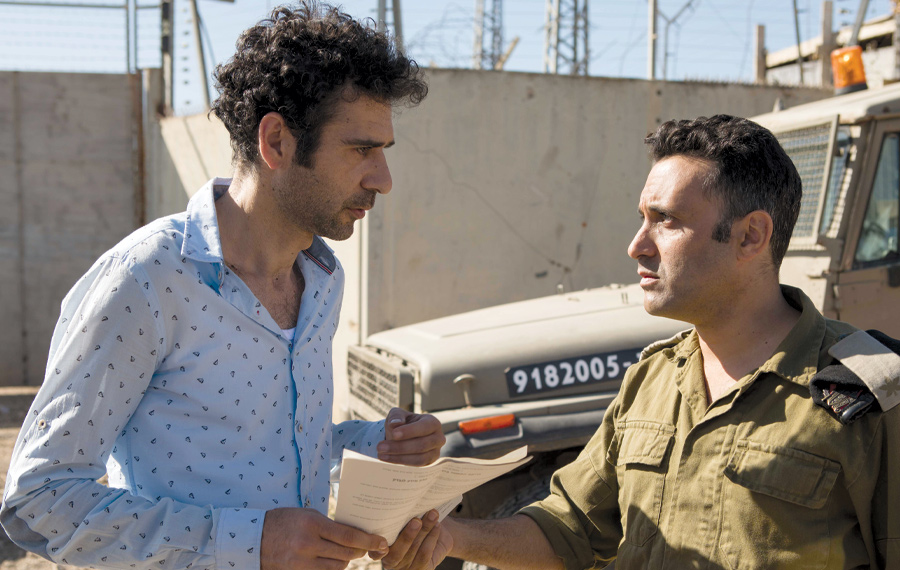 Kais Nashif and Yaniv Biton in “Tel Aviv On Fire.” Photo courtesy of Cohen Media Group
Kais Nashif and Yaniv Biton in “Tel Aviv On Fire.” Photo courtesy of Cohen Media Group Its title may evoke incendiary images of war, but “Tel Aviv on Fire” takes a different approach to the Israeli-Palestinian conflict, using humor to deftly send up both the titular soap opera at its center and the futility of the conflict itself.
Set in Ramallah in the West Bank, it follows Salam (Kais Nashif), whose TV producer uncle hires him to help the cast with Hebrew pronunciation and then promotes him to writer. He gets in over his head when an Israeli border security officer named Assi (Yaniv Biton) demands that he change the direction of the plot to favor the Israeli in the spy-love triangle plot. Wanting to appease his boss and Assi, who has the power to deny him passage at the border checkpoint, Salam is caught in the middle.
Writer-director Sameh Zoabi, a Palestinian Israeli citizen, has faced a similar dilemma in needing to accommodate the separate agendas of Israeli and European film funders and the Palestinian community. “I realized this is my reality and I should make a movie about it,” he told the Journal. “The comedy is true to my voice and came as a natural extension of the reality I grew up with. People are so polarized and jaded now that if you make a drama [about the conflict] people are not interested in watching. Comedy is a way to liberate people to think about politics in a different way.”
His main character, Salam, is “not a victim or terrorist or soldier. He’s a common man trapped in a political reality,” Zoabi said. “People on the West Bank never meet [civilian] Israelis. They only meet soldiers. My Israeli crew had never been to Ramallah or the West Bank because of the checkpoints and barriers separating Israelis and Palestinians. If they were allowed to meet, they would find out they have more in common than they thought. Making the movie, I wanted to take a more optimistic approach and remind people about the need to reconnect and see each other as human beings. How can you bring trust and connection between people if they don’t have the chance to share?”
“People are so polarized and jaded now that if you make a drama [about the conflict] people are not interested in watching. Comedy is a way to liberate people to think about politics in a different way.”
Mirroring the film in a way, Zoabi wrote the script with Dan Kleinman, a Jewish writer-producer originally from Louisville, Ky. They met when Zoabi was studying film at Columbia University and Kleinman was his teacher. “Most of my contribution was about the comedy,” Kleinman said. Both New York residents, they collaborated in person and then sent drafts back and forth. “We didn’t discuss politics while writing the script,” Zoabi said.

The film has been a crowd pleaser on the film festival circuit and embraced in Israel by Palestinians and Israelis. “I think people are tired of this disconnect and this ‘us against them.’ There’s a hunger for the end of the occupation and finding a solution,” Zoabi said. “People are ready for it. I think the film can speak to people and engage a new generation in talking about a conflict that nobody wants to talk about anymore. I have high hopes that this will make a difference somehow.”
Zoabi, best known for his Cannes award-winning short “Be Quiet” and features “Man Without a Cell Phone” and “Under the Same Sun,” was planning to be an engineer before he saw his first movie in a theater at 20. “We didn’t have movie theaters in Nazareth,” he said. He received his bachelor’s degree at Tel Aviv University in film studies and English literature and was awarded a Fulbright Scholarship from Columbia. Currently, he’s teaching at New York University and working on new projects: his first English-language film and a movie set in Gaza called “Catch the Moon.”
Kleinman, who is descended from Jewish immigrants from Austria, planned to be a mathematician until he caught the film bug as a college senior. “Two films that made an enormous impact on me were Buster Keaton’s ‘The General’ and ‘A Hard Day’s Night,’ ” Kleinman said. “I decided to go to film school.”
He and Zoabi continue to collaborate. “We had a lovely time together. It’s rare to find a collegial, congenial writing partner and we both feel really good about continuing to develop new projects,” Kleinman said.
Zoabi hopes that American audiences will leave the theater smiling but with a greater understanding of the film’s underlying message. “It’s a very painful situation masked with humor, but I hope people see both,” he said. “I hope that people see it and take something with them. I think films can bring a perspective to a conflict that has been going on for a long time. It almost feels like a soap opera that will never end. It’s time to end it.”
“Tel Aviv on Fire” opens Aug. 2 at the Laemmle Royal Playhouse 7 and Town Center 5.






















 More news and opinions than at a Shabbat dinner, right in your inbox.
More news and opinions than at a Shabbat dinner, right in your inbox.